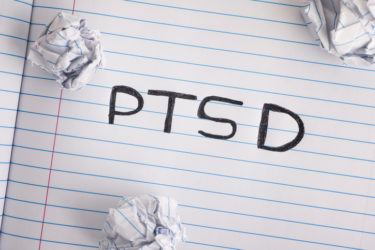Understanding PTSD in older adults

Post-traumatic stress disorder (PTSD) is a common mental health problem. It affects people who have experienced a traumatic life event.
That traumatic event could be anything from murder, rape, physical abuse or a national disaster.
Regardless of the type of traumatic event a person goes through, it is important that you are familiar with the symptoms of PTSD as a caregiver.
Understanding PTSD in older adults
Usually, people associate PTSD with veterans of various wars.
While a there are a number of veterans who live with PTSD, they are not the only ones who experience it.
For instance, I once worked at a facility where a elderly woman on admission was a Holocaust survivor.
It was not uncommon to hear her screaming at night and with requests to save her from the “Fuhrer”.
In that moment, there was nothing we could do or say to calm her down. She was reliving the event as if it was happening in the present.
As a caregiver, it is important that you realize that someone who is going through PTSD is not “crazy”, “weak”, “emotional” or “unable to let go of the past”.
PTSD can happen to anyone at any age. It can happen months and occasionally years after the original event.
Nobody wishes to experience a traumatic event over and over again.
However, for a lot of people who suffer with this mental illness, everything- their racing hearts, the inability to sleep and pure dread they experience when they encounter triggers that remind them of the trauma are very real.
Symptoms of PTSD
- People who have PTSD regularly experience flashbacks. During these flashbacks, the event is real again for a PTSD sufferer. They might even begin to call out the names of people who are not present in the room with them.
- Nightmares and night terrors. It is common for people with PTSD to experience insomnia that is related to constant nightmares they experience.
- People with PTSD may avoid certain places, people or situations that remind them of the trauma. For instance, if the person lived through a train accident, you will find that this person avoids public transportation at all costs.
- People with PTSD may be easily startled. Sometimes the things that startle them are things that normally would not startle a person at all.
- A person with PTSD may blame themselves for the traumatic event- whether it was their fault or not.
- A person with PTSD may begin to talk about harming themselves or suicide. Never take this type of talk lightly. The truth is while the media tends to mostly cover suicides among younger people, the rate of suicide increases sharply for white males after the age of 70 years. Sadly, cases of untreated PTSD have led to not just suicide but murders as well. Call the National Suicide Prevention Lifeline 1-800-273-8255. This lifeline is available 24 hours a day everyday. Dial 911 if it is an emergency.
- A lack of sleep leading to general tiredness is another symptom of PTSD.
- The person no longer enjoys events and activities they enjoyed in the past.
If any of these symptoms happen for more than a month and begin to interfere with a person’s daily functioning, PTSD is likely at play.
What you can do as a caregiver?
PTSD affects the sufferer and impacts the people around them.
I highly recommend that if you begin to notice any of the above symptoms in your elderly loved one that you help them seek professional mental health care.
PTSD is diagnosed by a psychiatrist or clinical psychologist. It is usually treated with a combination of therapy and medication.
Your role as a caregiver may include helping your loved one set up and attend appointments, finding other mental health care resources in your community and just encouraging words that help them gain perspective.
It is not easy to be the caregiver of a person struggling with PTSD.
So it is alright if you need someone to talk to and lighten your burden as well.
Caregiver self-care is important! You cannot give out of an empty vessel. So take care of yourself as well.
Closing Thoughts
Post-traumatic stress disorder is a mental health issue that affects thousands of people each year.
The impact of PTSD in older adults goes beyond the sufferer alone. It affects relationships and a person’s ability to function normally. It can affect their judgement and decisions and lead to less than ideal consequences.
Thus if you notice any of the symptoms I just discussed above, work to address their needs immediately.
Did you find this post helpful?
Share it with someone who might be caring for a loved one with PTSD.
